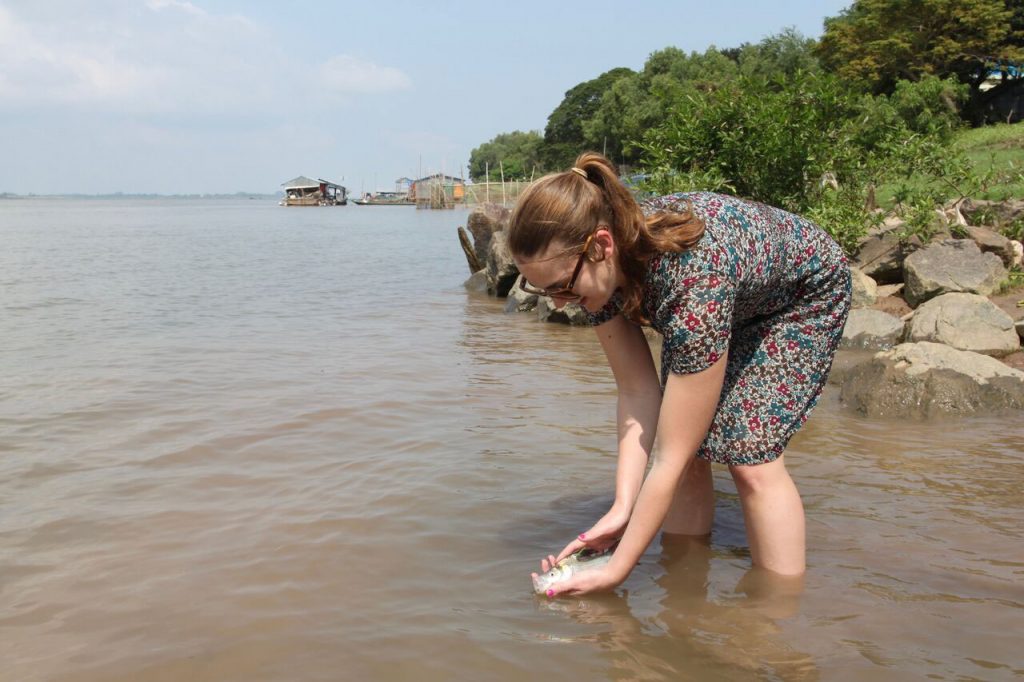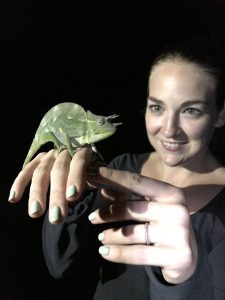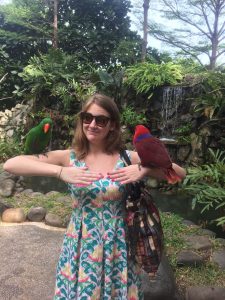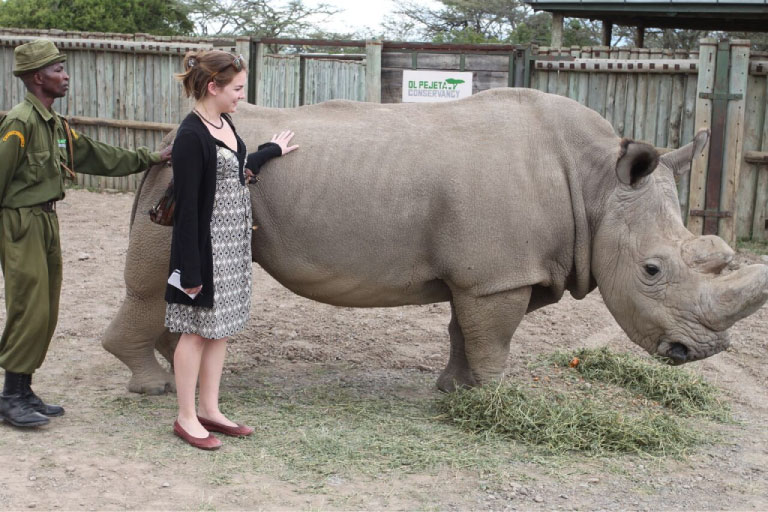SIT alumna publishes book on illegal wildlife trade
October 29th, 2018 | Alumni, SIT Study Abroad

Rachel Nuwer is a science writer and travel enthusiast who has been to 70 countries and lived in six.
One of them is Vietnam.
“It’s a beautiful place,” says the Biloxi, Mississippi, native about the Mekong Delta in southern Vietnam. “Picture muddy canals and banana trees. Everywhere you look is rich and green, and there are birds everywhere.”
But the beauty of one of the most biodiverse places on the planet carries with it an ominous side, which she details in her recently published book, Poached: Inside the Dark World of Wildlife Trafficking.
Poached takes readers across a dozen countries, introducing them to the people who engage in illegal wildlife trade — a multi-billion-dollar contraband industry, ranked just behind drug trade, arms dealing, and human trafficking — as well as to those fighting to stop the killing and trafficking of animals.
That journey, she says, started for her in 2006 on SIT Study Abroad’s program in Vietnam, Mekong Delta: Natural and Cultural Ecology.
As Nuwer tells it, she had already studied abroad in France and “done the Europe thing.” At the time, SIT had the only study abroad program in Vietnam; plus, the program had an open research component and enabled her to earn credits toward her biology degree.
“I was hungry for a bigger adventure,” she says.
During her studies in Can Tho, about three hours south of Ho Chi Minh City, she became aware of the illegal wildlife trade.
“There was a monkey I would pass every day on my bike ride to the university, and there were exotic animals on the restaurant menus, which deeply bothered me,” Nuwer explains. “That’s when the idea was planted.”

However, like the Mekong River, the road to writing the book was long and winding.
Nuwer completed a bachelor’s degree in biology at Loyola University in New Orleans and thought she wanted to become a scientist. She pursued a master’s degree in ecology at the University of East Anglia in the UK. To research her thesis, she returned to Vietnam to examine natural resource use, including illegal hunting, in two national parks.
During that time, she met a man who poached pangolin, also known as scaly anteaters, which are the most trafficked mammals in the world. Their scales are used in traditional medicine, and their meat is considered a delicacy — a way in Vietnam to show off wealth.
“It’s a cultural thing. As incomes rise, more and more people can afford it, and it’s really impacting the environment,” Nuwer explains.
Midway through her master’s, an uncomfortable realization dawned on her.
“I wasn’t cut out to be a scientist,” she says.
She loved writing but hated statistics. She enjoyed field work but found data collection tedious.
“I had a crisis of faith about my decisions,” admits Nuwer.
Around the same time, one of her lecturers mentioned something called science journalism.
“I googled it and found out New York University had a program,” she says.
Nuwer completed her master’s degree in East Anglia and two weeks later started a second master’s degree in NYU’s Science, Health, and Environmental Reporting Program.
“It was perfect!” she says.
“I could learn about science and talk to people who did science, but I wouldn’t have to do the science,” Nuwer, who now lives in Brooklyn, explains. “Given my skills, I thought science journalism would be the best way for me to make a difference for the things in the world I care about most.”
She finished her second master’s degree in 2011, following two internships — one at Audubon magazine and the second at The New York Times’ Environment Desk — and seamlessly switched career tracks
“I got to be in a newsroom and met editors that I still work with today,” she says.
Nuwer is an award-winning journalist who regularly contributes to top publications, including National Geographic, Scientific American, and The New York Times.
Now she’s also a book author.

Her aim was to write a book to engage people who didn’t know much about the illegal wildlife trade.
“When I wrote it, I had people like my dad in mind — people who are smart and curious about the world, but who perhaps have never given animals or wildlife trade much thought,” explains Nuwer. She hopes the human stories will help capture a wider audience and inspire empathy for those protecting wildlife, who often risk — and sometimes lose — their lives in the process.
She says there needs to be a carrot-and-stick approach to stopping wildlife trafficking and explains that economic development and aid can play important roles.
”Until these communities are brought out of poverty, it’s not going to ever end,” Nuwer says in a Sciencentric podcast.
She hopes her book inspires more people to support conservation organizations or call their representative to take a tougher stand against the illegal wildlife trade.
Nuwer adds that even seemingly innocuous actions, like a visit to a tiger petting zoo in Thailand, can have disastrous effects. Behind the scenes, the tigers are illegally sold and slaughtered, their bones turned into wine, their teeth and claws used for making jewelry, and their meat winding up on plates.
“There’s lots of small things people can do to stop this,” she says.
Returning to the genesis of Poached, Nuwer says, “SIT change my life. It was a really formative experience for me.”

She’s remained in touch with Vietnamese friends and her homestay sister, Thao Kim Nguyen, who even makes an appearance in her book. Using frequent flyer miles, Nuwer recently brought Nguyen for a visit to New York City and her book launch party in Mexico.
Nuwer recalls at the end of the SIT program another student saying he didn’t think they realized how much Vietnam would eventually mean to them.
“I knew,” she says.
====================================================================================
Nuwer says people shouldn’t feel hopeless. There are many organizations making a difference. Here are a few to support:
African Parks rehabilitates failing national parks by stopping poaching, employing local rangers and working side by side with people on the ground.
Save Vietnam’s Wildlife rehabilitates pangolins and releases them in safe locations. 100% Vietnamese run.
Wild Aid works with celebrities like Leonardo Di Caprio, Yao Ming, and Arnold Schwarzenegger to reduce demand for wildlife products.
Education for Nature – Vietnam runs a nation-wide hotline for reporting wildlife crime and organizes rescue missions.
Animals Asia rescues bears in China and Vietnam from the bear bile trade.
